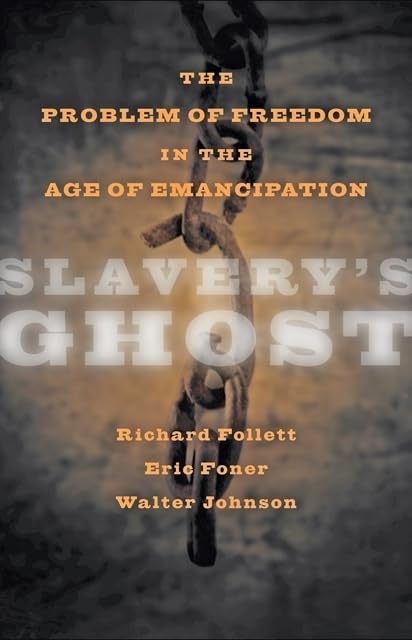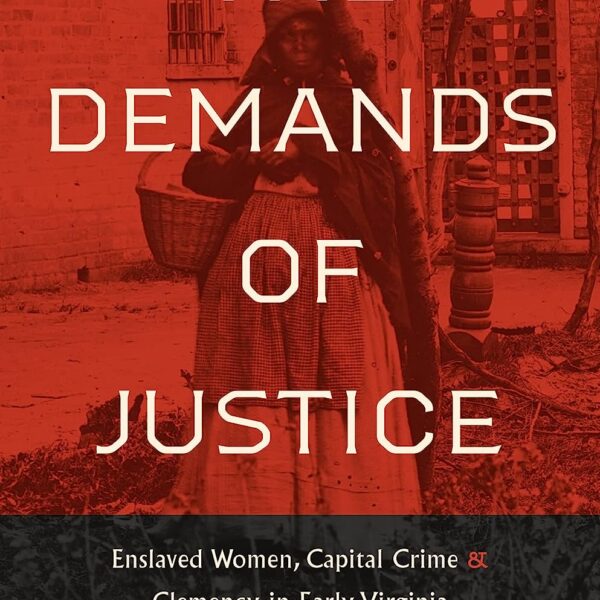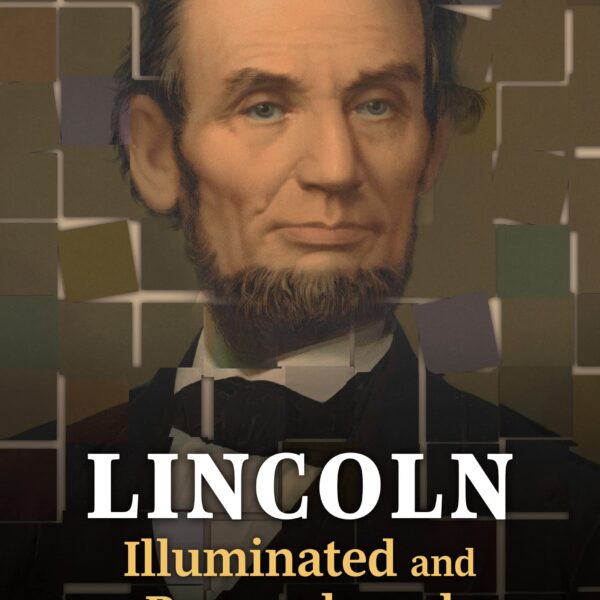A brief but thought-provoking collection of essays that brings together lectures delivered at the University of Sussex’s Marcus Cunliffe Centre for the Study of the American South, Slavery’s Ghost is framed by several persistent and important considerations in the historiography of slavery and emancipation. One is how to describe simultaneously the repressive realities of enslavement and the remarkable capacity of the enslaved to preserve and express their humanity amidst it, a balance so difficult to strike that most scholars end up inclining either toward a celebration of the black freedom struggle that risks losing sight of slavery’s extravagant brutality or toward a requiem for millions of black people who saw their aspirations snuffed out by white supremacy, violence, and the ultimate indifference of the federal government. Another is whether to consider the Civil War a sea change that expanded the horizons of black life in the United States so dramatically that it amounted to a genuine revolution, or to see the moment of emancipation as a severely limited triumph whose potential implications ran smack into stubborn structural obstacles such that freedom itself amounted to little more than a legal fiction for most people of African descent. Together the three very fine scholars whose work is comprised here provide no simple or straightforward paths through these minefields, and each in his way tells a deeply sobering story that suggests not only the material and ideological narrowness of emancipation but also the ways that such an unfolding was unavoidable. Their collective aim, however, is less to downplay the radical meaning of freedom than to present some of the ways in which that freedom could not but be beset by slavery’s awful legacy.
In the collection’s most ambitious and challenging essay, Walter Johnson laments the extent to which historians have come to privilege efforts to identify the supposed “agency” of enslaved people, arguing that to conceptualize the experience of the enslaved primarily in terms of their individual abilities to make material gains and acquire “autonomy” is to drain that experience of its historical specificity and resolve it instead into a bland and flatly conventional liberal narrative. Tracing the historiographical roots of the quest for “agency” back ultimately to the work of labor historians seeking alternatives to Marxist overdeterminism, Johnson of course recognizes and holds fast to the need to seek the historical consciousness of enslaved people. But he demands that we carve out space for a reinvigorated and dynamic understanding of the actual circumstances that shaped available options for the enslaved while still grasping the importance and forcefulness of those that were within their power to exercise. “We might try to understand enslaved people’s actions and ideas,” Johnson writes, “as, at once, fiercely determined—hedged in, limited, and shaped by the material conditions of their enslavement—and insistently transcendent—productive of new, creative, vibrant, and sustaining forms of human being, commonality, and, ultimately, solidarity” (28).
In his contribution to the collection, Eric Foner considers one vital circumstance that hedged in the possibilities of emancipation, describing how someone as sincerely opposed to slavery as Abraham Lincoln could persist, even several years into the Civil War, in seeing colonization as a legitimate alternative to an interracial democracy that he found difficult if not impossible to fathom. Though many historians consider colonization little more than a wildly impractical if not delusional precursor to the Abolitionist Movement, Foner reminds us that it was also wildly popular and embraced by many leading politicians and public figures. Particularly for men like Lincoln who were products of Border States and areas in the lower portion of what had been the Northwest Territory, colonization enabled staking out an antislavery position that shied away from abolition’s radicalism. Lincoln’s position was a politically calculated one that he imagined as a way to wean states like Kentucky and Missouri slowly off of slavery, and Lincoln never embraced ideas about the mandatory expulsion of black people or cared particularly about the prospect of race mixing as some colonizationists did. Lincoln’s belief in colonization was nonetheless sincere, so much so that he pushed it periodically right up to the moment he issued the Emancipation Proclamation and even experimented during the war with creating a small outpost of black colonists on an island near Haiti. By 1864, Foner argues, Lincoln’s contact with prominent black leaders and his sense of the performance of black Union soldiers had led him largely to give up on colonization. He began thinking seriously instead about the role blacks would play as free persons in the postwar world. Nonetheless, the delimited racial imagination of the Great Emancipator himself pointed toward some of the constricted parameters within which once enslaved people would have to operate in the years after 1865.
Elaborating on the notion implicit in Foner’s essay that the constraints of the antebellum era would likely continue to impinge, albeit in modified forms, upon the lives of African Americans well beyond emancipation, Richard Follett concludes Slavery’s Ghost with a demonstration of how reminiscent of slavery the labor regime of Louisiana’s sugar plantations could be long after freedom came to its workers. By the late 1860s a wage system did prevail in the sugar districts of Louisiana. But so did a plantation model of land ownership and labor organization in which gangs of mostly male black workers still toiled on massive white-owned estates. Slavery may have been gone but ideologies of white mastery and black dependency were not, and neither were the material inequalities wrought by white land ownership or the ferocious demands of sugar production. Consequently, black cane workers who chafed at their working conditions and their political subordination tried seeking new contracts from different landowners paying higher wages and even occasionally went on strike, but white sugar planters saw only a lazy and useless rabble that could not be made into a docile free working class. They had been forced into making some accommodations during the Civil War and Reconstruction, but by the middle of the 1870s the sugar barons had united to limit black mobility and hold down wages, and they had both state-sanctioned and extralegal violence at their disposal to stifle labor unrest and nearly every form of black political mobilization. Taking the methodological considerations of Johnson’s essay and the circumscribed prospects of national policy delineated by Foner, and bringing them into the dogmatic and material oppression of Louisiana’s sugar plantations, Follett reveals that the transcendent gains of freedom could only be so real until the specter of slavery was exorcized. That project would take generations.
Joshua D. Rothman is an Associate Professor of History and the Director of the Frances B. Summersell Center for the Study of the South at the University of Alabama. He is also the author of Notorious in the Neighborhood: Sex and Families Across the Color Line in Virginia, 1787-1861.





